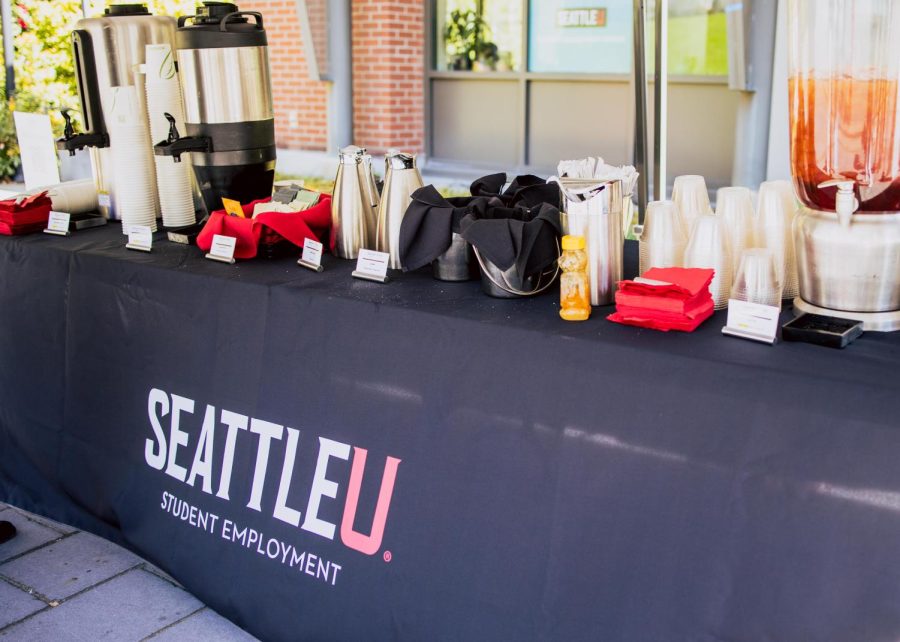Inside Student Employment and Working on Campus
Free coffee and tea for student employees.
Seattle University offers a plethora of on-campus work opportunities: Handshake currently promotes 39 different job openings at the university. For students with work-study, these jobs allow them to meet the full value presented in their financial aid package, but on-campus employment is also available for those who don’t qualify for work-study.
Sharon Leary, director of student employment, acknowledged that certain jobs show preference to students with demonstrated financial need but elaborated on Seattle U’s overall acceptance of students into on-campus positions regardless of their work-study status.
“We do not require students to have work-study in order to work on-campus because there are limitations to [work-study eligibility] in that international students are not eligible for work-study,” Leary said. “FAFSA is just one piece of determining financial need.”
In addition, Leary explained that students receive advantages outside of fiscal benefits.
“[Student Employment works] really hard to have job descriptions that are intentional and allow students to gain professional skills and competencies that they can use towards a variety of career paths. Additionally, student employment can also provide a sense of belonging,” Leary said.
Brandon Teola, a second-year English major, works as an office assistant at Seattle U’s Writing Center. Teola echoed Leary’s sentiment that on-campus jobs can create a sense of acceptance and security.
“Everyone is really kind, understanding and compassionate. Our supervisors understand that we are students too,” Teola said. “For Student Appreciation Week, [our supervisors] gave us donuts and each week, we get a ‘wellness hour’ where we get a paid hour to take care of ourselves.”
Madison Powell, a third-year biology major, currently serves as the president of the Health and Wellness Crew (HAWC), where she has worked for two years. She amplified the notion of community being found in campus work spaces, especially after having classes online for her first year.
“I felt very disconnected from campus. Getting involved with HAWC made me like I was part of the community on campus. I’ve also made some great friends and mentors along the way, which I treasure,” Powell said.
Seattle U currently pays all student workers equally, with hourly wages reflecting Seattle’s current minimum wage, $18.69 per hour. Different perspectives arise from student workers on whether or not student workers should be compensated differently based on their job descriptions or seniority.
“I think there should be a pay range based on the students’ responsibilities that they have within their roles. If the job title and description, for example, include more work and time dedicated, the pay range should be higher,” Powell said.
Teola, on the other hand, has seen student workers with seniority and lead positions compensated for their experience through more work hours.

“We have lead office assistants and lead writing consultants who usually end up working more hours, so they get compensated for that. So, I think it’s fine–the flat rate makes it equal for everyone,” Teola said. “However, I don’t have experience with other jobs on campus where there is a stark difference between people with seniority [and those without].”
Leary stated that pay scales have been a topic of discussion within student employment and that the university plans to take action in the future regarding job-based compensation.
Outside of the financial components of working on-campus, students must balance their job work with their schoolwork.
“There have been several times where I’ve had to take a step back and think about what my capacity actually is and what I know I can handle. Specifically for HAWC, once I have completed my office hours for the week, I’ve been trying to make sure that I focus on school. School is my number one priority,” Powell said.
Teola has also experienced struggles balancing his school work and job position.
“I’m a student in the Honors Program, so it’s difficult to balance the course load with my work hours, and I usually have to work a smaller amount of hours than my peers so I can devote more time to do my homework,” Teola said.
The Honors Program has lost students due to the stress of balancing academics with work in past years, particularly during COVID-19.
Despite the complications Powell and Teola have faced as they navigate attending university and working part-time, they encourage Seattle U students to seek on-campus employment and hope that students who may be unsure about working on-campus take the time to explore the options available.
“If students are ambivalent about working on campus, they can attend different events that organizations that they are interested in put on. They can talk to the student leaders, advisors and staff and get their input just by inquiring about the role,” Powell said.
The future of student compensation at Seattle U is still a matter of debate between students and university administrators. For now, students will continue to make $18.69 per hour, regardless of job title.


